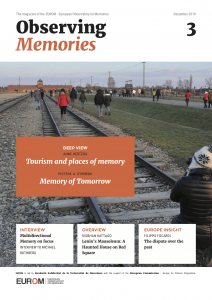The work of memory is a process. The conclusions of comparative examples and theoretical cases help us – or should help us – to learn from history and its memorial transmission and apply new formulas that draw on more and better engagement from our fellow citizens. This is the engagement that guides our actions, research and efforts to mobilize professional academic processes in and with society in order to build collective memory. The challenge is to hold onto the tension between the varying scales and dimensions of such a process or processes. And this is precisely what we want to share in the present issue of Observing Memories. The aim of our journal is to reflect, learn and share knowledge, but always with a multifaceted engagement from all quarters.
This issue of Observing Memories represents the consolidation of a high quality multidisciplinary journal which explores the past from a permanent trans-European and international perspective. With each issue published, the Observatory’s reputation has grown and we are delighted to present our latest edition, published just after the exhumation of the dictator Francisco Franco from the mausoleum of the Valley of the Fallen. The removal of Franco’s remains is an important step for democracy both in Spain and in Europe. It means that we can now begin to consider this place of terror from the perspective of heritage and culture – perhaps even as a tourist destination, once tribute has been paid to the memory of the thousands of victims buried there illicitly by the dictatorship.
Cover picture: View from the bedroom, Hospedería Santa Cruz, Valley of the Fallen (Cuelgamuros) | Silvia Marimon, 2018. By Jordi Guixé, director of the European Observatory on Memories (EUROM) of the University of Barcelona’s Solidarity Foundation A year ago we published the first issue of Observing Memories, a digital magazine that aimed to offer a …


